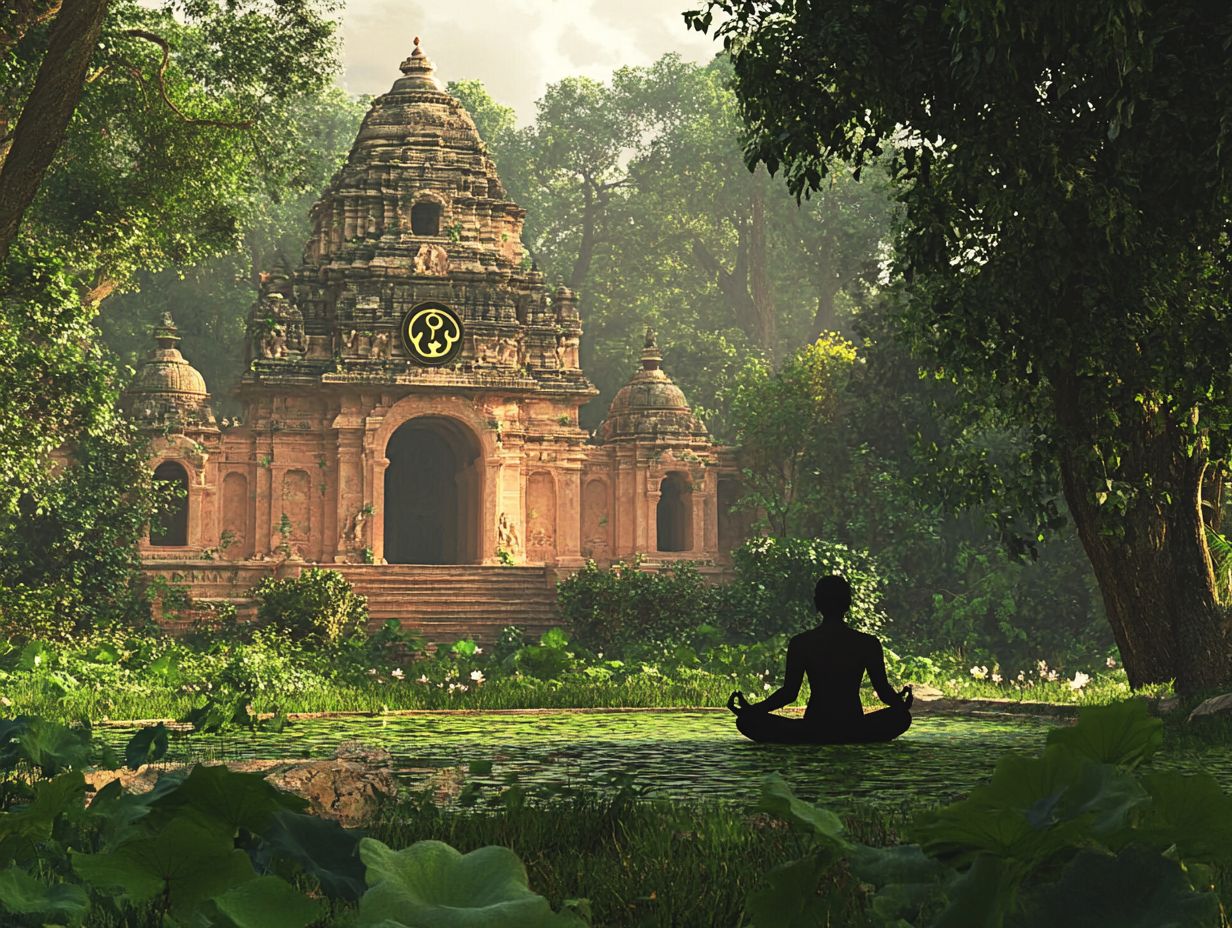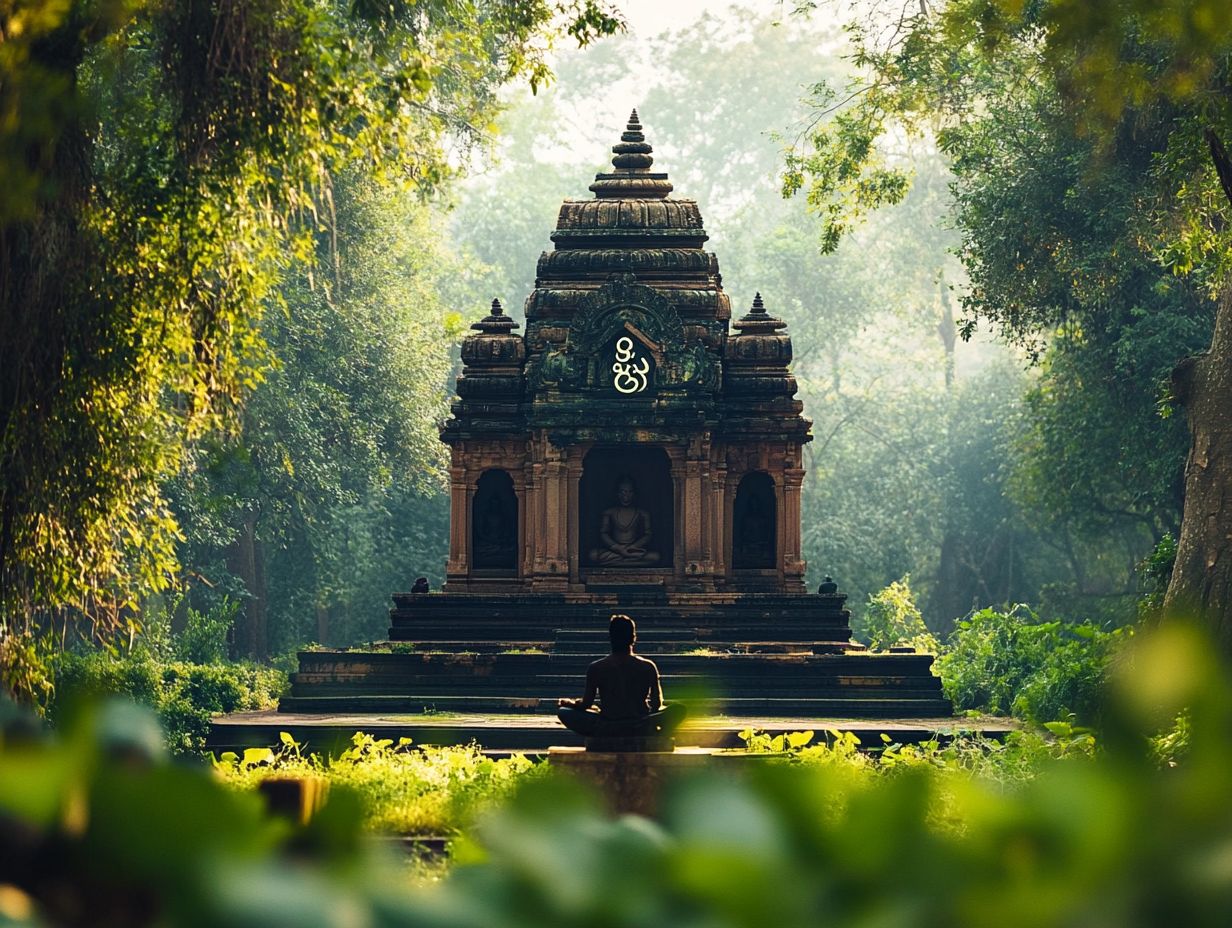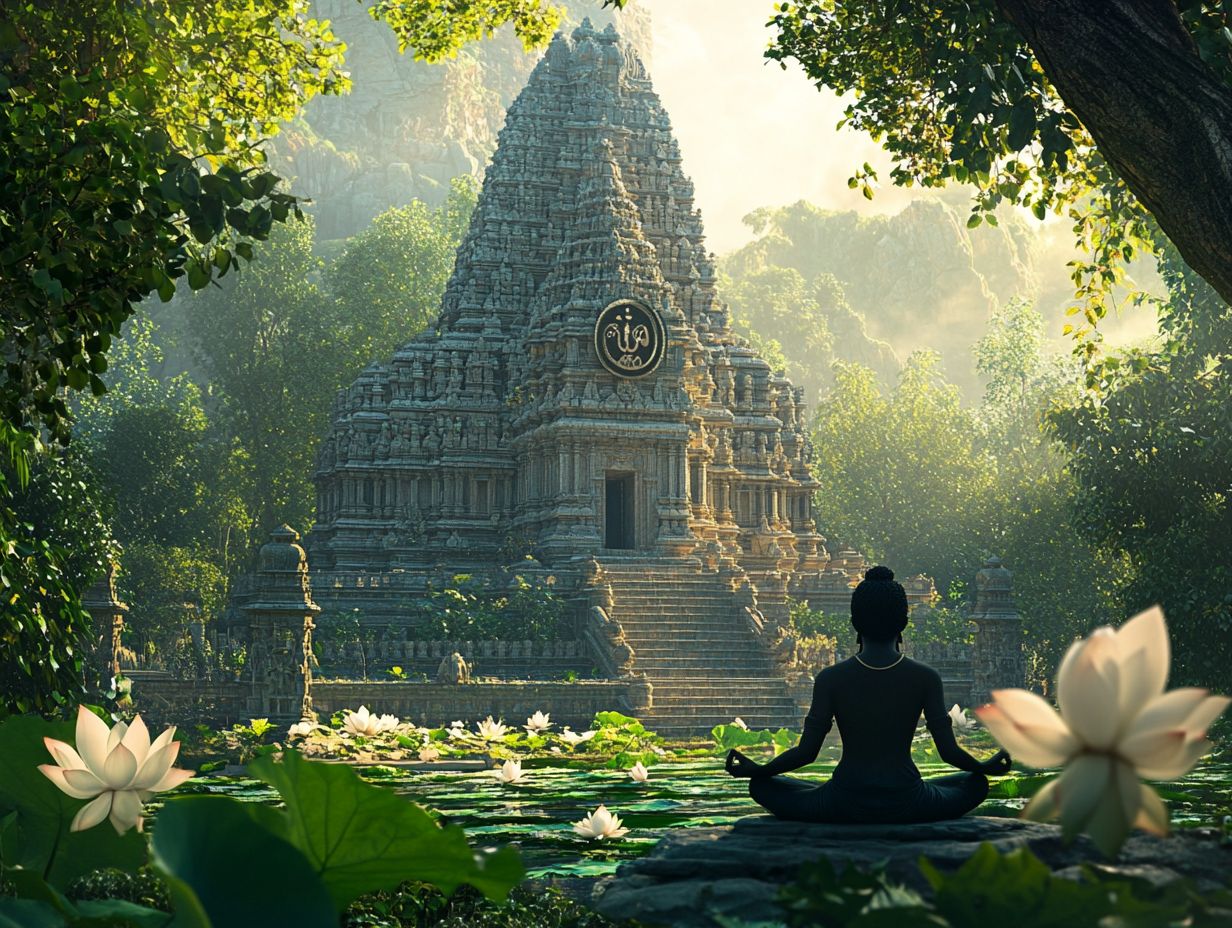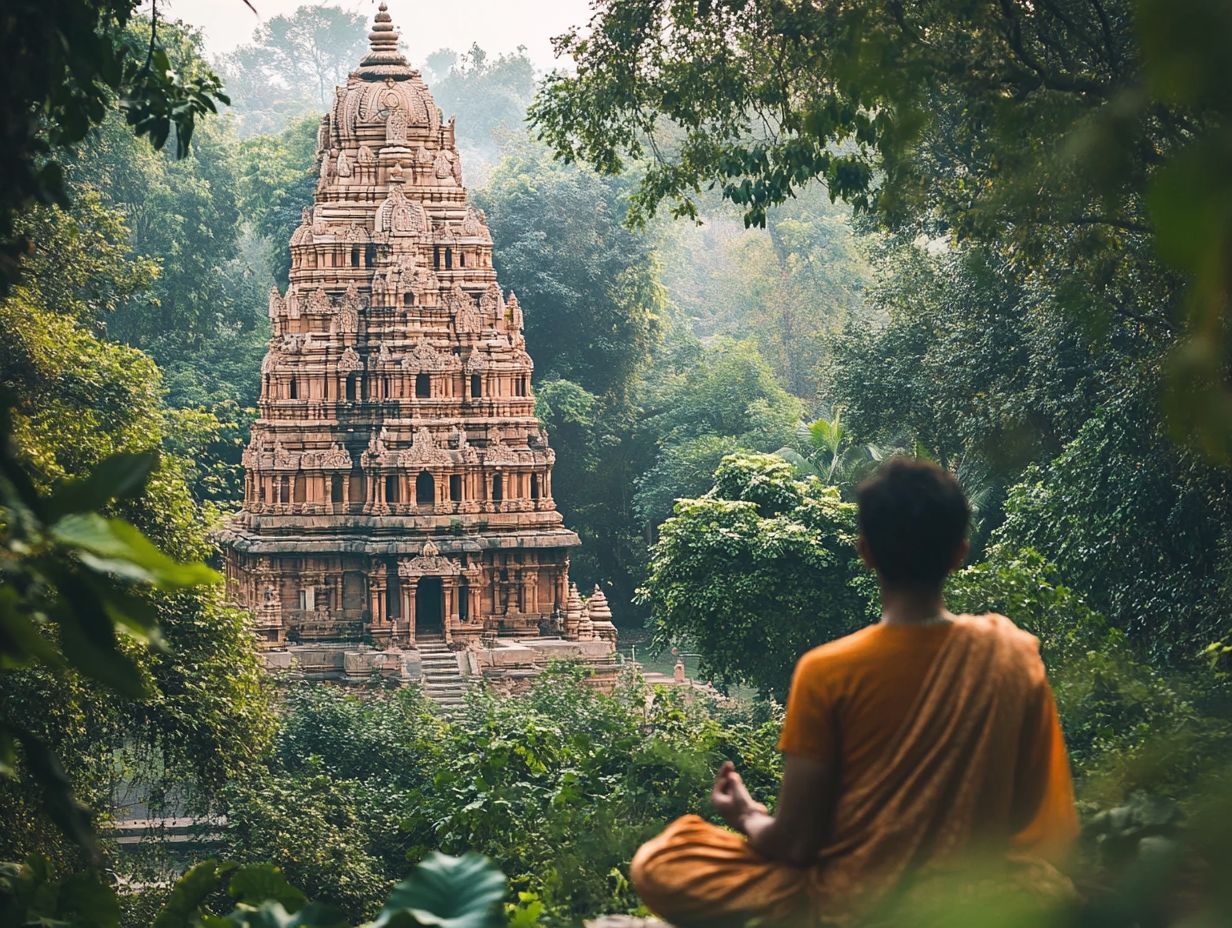Is Hinduism a Religion or Philosophy?
Hinduism, recognized as one of the world’s oldest religions, embodies a rich tapestry of beliefs, practices, and traditions that have evolved intricately over thousands of years. Its origins, deeply rooted in ancient texts and rituals, offer a complex understanding of the divine, the cycle of life, and moral principles such as dharma and karma.
A thorough exploration of its core beliefs including the concept of God, reincarnation, and worship will reveal not only the nuances of Hinduism but also provide a comparative lens through which to view other religions, philosophies, and the worldview, alongside the controversies that have arisen throughout its history.
Furthermore, the discussion will encompass how modern interpretations are reshaping Hinduism in the contemporary world, addressing contemporary issues and engaging in interfaith dialogue.
This exploration invites one to embark on a journey through the multifaceted landscape of Hinduism, a spiritual awakening rich with insight and depth.
History of Hinduism

The history of Hinduism presents a rich tapestry interwoven with ancient texts, cultural practices, and spiritual beliefs that have developed over thousands of years. As one of the oldest religions in the world, it embraces a variety of philosophical schools and traditions, notably the Vedas and Upanishads, which offer profound insights into foundational concepts such as Dharma, Karma, and Moksha.
Its evolution illustrates the dynamic interplay among various sects and movements, each contributing to the religion’s depth and complexity. Consequently, Hinduism transcends mere religion; it emerges as a vibrant philosophy and belief system that continues to shape humanity’s collective consciousness.
Origins of Hinduism and its Sacred Geography
The origins of Hinduism can be traced back to the ancient Indus Valley civilization, where early religious practices began to emerge through a rich tapestry of rituals and beliefs. These formative elements would ultimately influence the development of one of the world’s major religions, contributing to its sacred geography and cultural identity.
Archaeological discoveries, such as remnants of sophisticated drainage systems and striking seals depicting various deities, indicate a well-organized society that undoubtedly engaged in specific rituals to honor their gods.
The Vedas, composed later during the early Vedic period, build upon these foundational concepts, introducing a more structured framework for spiritual practices. These texts, often replete with hymns and philosophical discourses, reflect the evolution of religious thought shaped by earlier cultures and underscore the significance of rituals in forging a connection with the divine.
The interplay between the ancient practices of the Indus Valley and the codifications found in the Vedas illustrates an intricate tapestry of belief, establishing the groundwork for Hinduism as it is recognized today.
Evolution of Hinduism and its Philosophical Inquiry
The evolution of Hinduism has been characterized by significant transformations, including the emergence of various sects and philosophical schools. Each of these factions offers distinct interpretations of sacred texts, contributing to the rich diversity inherent in the religion and engaging in profound philosophical inquiry.
Throughout the centuries, influential figures such as Adi Shankaracharya and Ramanuja have played pivotal roles in shaping doctrines and stimulating debates on fundamental concepts like Brahman and Atman, thereby deepening theological discourse.
The synthesis of diverse practices and beliefs, exemplified by the integration of tribal traditions with Vedic teachings, underscores the adaptability and inclusivity of Hindu thought.
This intricate interplay between historical context, scripture, and philosophical inquiry has enabled practitioners to engage with spirituality through varied perspectives, ultimately resulting in a vibrant mosaic that preserves the essence of Hinduism while adeptly addressing modern challenges and embracing global perspectives.
Beliefs and Practices of Hinduism: Ethics and Rituals
The beliefs and practices of Hinduism embody a profound spirituality, intricately woven with ethical principles, a vibrant array of rituals, and a deep-seated connection to the philosophical tenets that shape the lives of its adherents. This synergy of spirituality and ethics fosters a holistic approach to existence, guiding adherents through the complexities of life with a sense of purpose and devotion.
Concept of God in Hinduism
The concept of God in Hinduism presents a rich and multifaceted landscape, embracing a spectrum of beliefs that range from polytheism to monism. In this tradition, Brahman is regarded as the ultimate reality, while Atman represents the individual soul that yearns for union with the divine. These diverse theological views illustrate the depth of Hindu cosmology and the nature of existence.
This intricate tapestry of divinity showcases a multitude of deities, each personifying distinct aspects and characteristics of the singular universal spirit. Individuals are encouraged to forge personal connections through worship and rituals that resonate with their unique experiences and understanding of consciousness.
As practitioners explore these profound philosophies more deeply, they uncover an underlying unity within the diversity of beliefs. This journey not only enhances their spiritual experience but also underscores the importance of coexistence and reverence for all forms of life. Such beliefs give the power to devotees to engage in meaningful practices that honor their chosen deities while simultaneously acknowledging the shared essence that permeates all spiritual paths, thus promoting religious tolerance and pluralism.
Reincarnation and Karma
Reincarnation and Karma stand as foundational pillars in Hinduism, encapsulating the perpetual cycle of samsara, in which an individual’s ethical actions dictate their future existences. This understanding shapes the philosophy of life for many adherents, emphasizing the significance of every action.
These principles inspire practitioners to engage in profound introspection regarding their choices and behaviors in the present life, for every action be it virtuous or detrimental exerts a direct influence on their future incarnations. The concept of karma serves as a moral compass, compelling individuals to act with integrity and compassion. Those who embrace selfless service, known as seva, contribute positively to society while simultaneously accumulating good karma, thereby laying the groundwork for a more favorable rebirth. This moral and ethical framework is crucial for personal growth and social harmony.
In stark contrast, actions driven by greed or malice may entrap individuals in a cycle of suffering. This intricate interplay between actions and consequences cultivates a heightened sense of accountability, encouraging individuals to pursue personal growth and ethical decision-making, ultimately transforming their character across lifetimes.
Hindu Scriptures and Philosophical Teachings

Hindu scriptures, notably the Vedas and Upanishads, stand as foundational texts that encapsulate the philosophy, ethics, and spiritual practices intrinsic to the religion, guiding the beliefs of its followers. These sacred texts form the basis of theological and philosophical inquiry, shaping the contours of Hindu thought.
These ancient writings not only lay the groundwork for Hindu thought but also provide profound insights into the nature of existence, the self, and the cosmos. For example, the Rigveda, one of the oldest known scriptures, comprises hymns that explore the themes of creation and the roles of divine forces, while the Upanishads tackle deeper metaphysical inquiries concerning the soul and Brahman. The Vedas and Upanishads are studied not only for their religious significance but also for their rich philosophical and metaphysical content, making them pivotal in the study of the philosophy of religion.
This rich intellectual tradition nurtures a culture deeply engaged in spiritual exploration, influencing a myriad of philosophical debates throughout history and continuing to inspire seekers of truth in the present day.
The teachings within these texts resonate through practices such as yoga and meditation, positioning the scriptures not merely as historical artifacts but as living legacies that shape contemporary spiritual journeys and mystical experiences.
Worship, Rituals, and Pilgrimage
In Hinduism, worship and rituals serve as essential practices that cultivate both community bonds and individual devotion. These expressions are often manifested through puja ceremonies, vibrant festivals, pilgrimages, and significant rites of passage that honor the sacredness of life.
Such practices not only connect individuals to the divine but also intricately weave a tapestry of shared identity and purpose among community members. Each ritual, whether it be the joyous celebration of Diwali or the profound observance of a child’s naming ceremony, presents an opportunity for personal introspection and collective joy.
The importance of these traditions becomes particularly evident in daily life, where they provide moments of tranquility amidst the chaos, promote moral values, and enhance familial connections. Festivals, in particular, symbolize renewal and unite people, reinforcing a sense of belonging and cultural pride that transcends individual differences. Such rituals and festivals are not only significant for their immediate spiritual benefits but also for their role in preserving cultural identity and community cohesion.
Comparison with Other Religions and Philosophies of Life
An examination of Hinduism alongside other religions and philosophies unveils both striking similarities and significant differences, particularly in aspects such as conceptions of the divine, ethical principles, and the ultimate objectives of human existence. This comparative religion study enhances the understanding of spiritual seekers, promoting interfaith dialogue and religious tolerance.
Similarities with Buddhism
Hinduism and Buddhism exhibit a tapestry of philosophical and spiritual affinities, particularly in their shared concepts of Dharma, meditation, and the quest for enlightenment, all of which resonate with a common cultural heritage. Both religions emphasize the importance of ethical conduct, mystical experience, and the pursuit of liberation from suffering.
Both traditions intricately interweave the principles of karma and samsara into their belief systems, profoundly influencing their views on ethical living, dharma, and the cyclical nature of life and rebirth. Hinduism presents karma as a moral law governing one’s actions and their repercussions across lifetimes, while Buddhism offers a perspective that emphasizes intention and mental states, advocating mindfulness as a vital pathway to liberation.
The concept of samsara, representing the perpetual cycle of birth, death, and rebirth, emerges as a central concern for adherents of both faiths, motivating them to pursue spiritual growth and liberation. Ultimately, these philosophies inspire practitioners to cultivate compassion, engage in ethical deeds, and aspire towards an ultimate truth, illuminating a deeply shared journey toward meaning and moral responsibility.
Differences with Abrahamic Religions and Hinduism
The distinctions between Hinduism and the Abrahamic religions primarily reside in their perspectives on the divine, the nature of their scriptures, and their underlying belief systems. Hinduism offers a more pluralistic and polytheistic framework, in stark contrast to the monotheistic structures of Judaism, Christianity, and Islam. While the Abrahamic religions tend to emphasize a single ultimate reality, Hinduism’s philosophical and spiritual traditions provide a diverse array of viewpoints.
This fundamental divergence not only shapes their conceptions of God but also informs their respective rituals and ethical practices. In Hinduism, a multitude of deities symbolizes various aspects of the divine, fostering diverse expressions of worship where personal interpretation and individual experience hold significant importance.
Conversely, the Abrahamic traditions uphold the belief in a singular, sovereign God, who reveals Himself primarily through sacred texts such as the Torah, Bible, and Quran. These scriptures impose adherence to established doctrines, cultivating a sense of communal worship that often emphasizes morality and ethical behavior as dictated by divine command. This reflects a more exclusivist approach compared to the inclusivist and pluralistic tendencies within Hinduism.
Such contrasting views on the divine and scripture inevitably shape how practitioners engage in worship and interpret their ethical responsibilities in daily life.
Controversies Surrounding Hinduism and Its Practices
Controversies surrounding Hinduism frequently center on deeply ingrained issues, including the caste system, idol worship, and the intricate dynamics of conversion. These topics provoke critical inquiries into religious tolerance, social structures, and the underlying societal frameworks that shape this ancient faith.
Caste System

The caste system in Hinduism embodies a hierarchical social structure with profound implications for ethics, community interactions, and discrimination, sparking ongoing debates regarding its relevance in contemporary society. This system also raises questions about social justice and human equality.
Having its roots thousands of years ago, this intricate system initially stemmed from occupational divisions, which eventually solidified into rigid social stratifications that govern not only professional choices but also personal relationships and cultural practices. Its pervasive influence has shaped social interactions, frequently resulting in exclusion and prejudice against those belonging to lower castes. This framework also intersects with broader discussions on human rights and social reform.
The enduring presence of caste-based discrimination poses significant challenges in modern society, as individuals confront the ethical dilemmas surrounding equality and justice. While communities endeavor to promote inclusivity, the lingering effects of the caste system often obstruct progress, underscoring an urgent need for reform and heightened social awareness to confront these long-standing biases.
Idol Worship and Devotional Practices
Idol worship in Hinduism represents a profound practice that prompts reflection on the nature of divinity and spirituality, serving as a tangible manifestation of the divine for devotees engaged in rituals and worship. This intricate tradition not only cultivates a personal connection with cosmic forces, but also invites contemplation on the attributes of God and the essence of worship itself. Additionally, it highlights the rich symbolism and aesthetic dimensions inherent in Hindu art and architecture.
Many adherents regard these idols not merely as physical forms but as conduits through which divine energy flows, thereby facilitating a deeper spiritual experience. The rituals associated with idol worship ranging from elaborate ceremonies to daily offerings embody a rich tapestry of beliefs and customs that reflect the diverse philosophies within Hinduism. These practices also play a crucial role in the communal and societal aspects of Hindu life.
This practice fosters communal participation, linking individuals to a broader spiritual community while illuminating the nuances of devotion and reverence that are integral to their faith.
Conversion and Religious Tolerance
The exploration of conversion in Hinduism, in conjunction with the broader discourse on religious tolerance, underscores the intricate nature of interfaith dialogue and the interplay between personal beliefs and societal norms. This reflects the broader issues of inclusivism and exclusivism within religious practice.
Historically, conversion has emerged as a contentious topic within Hindu communities, frequently interpreted through the lenses of cultural identity and social status. Contemporary viewpoints reveal a spectrum of opinions: some advocate for inclusivity and respect for individual spiritual journeys, while others voice apprehensions regarding the potential dilution of traditional practices and beliefs. These discussions often intersect with broader themes within the philosophy of religion and comparative religion.
This dichotomy poses substantial challenges for interfaith dialogue, as individuals seek to reconcile their convictions with societal expectations. The implications for religious tolerance are significant; the tension between preserving unique cultural heritage and embracing a pluralistic society can foster misunderstandings and conflict. This reality calls for a nuanced approach to dialogue that honors the integrity of all faiths, facilitating a respectful exchange that recognizes the complexities involved.
Modern Interpretations of Hinduism
Contemporary interpretations of Hinduism encompass a rich tapestry of beliefs and practices, spanning from New Age movements that prioritize spirituality and personal development to the burgeoning influence of Hindu nationalism. Each of these elements contributes uniquely to the religion’s global impact and evolution.
New Age Hinduism
New Age Hinduism embodies a modern interpretation of traditional beliefs, seamlessly integrating practices like yoga and meditation with an emphasis on spirituality and the expansion of consciousness. This contemporary approach aims to render ancient philosophies accessible to a wider audience, highlighting personal transformation and holistic well-being.
Key elements such as mindfulness, chakra healing, and energy work resonate deeply with individuals seeking profound meaning in their lives. By harmonizing rituals and teachings from various traditions, New Age practitioners cultivate inclusive environments that draw in a diverse array of spiritual seekers.
The global intrigue surrounding these paths reflects an innate desire for connection and balance in the midst of contemporary life s chaos, inviting individuals to delve into their inner selves while fostering a sense of community through shared experiences and practices.
Hindu Nationalism and Socio-political Context
Hindu nationalism has emerged as a compelling political ideology aimed at redefining Hindu identity and beliefs within the framework of contemporary Indian society, often resulting in profound societal and cultural implications. This movement also raises important questions in the realms of secularism and religious pluralism.
This movement, which can be traced back to the late 19th and early 20th centuries, has gained considerable momentum in recent decades, particularly with the ascent of prominent political figures who advocate for the reassertion of Hindu cultural values in governance and public life. Proponents contend that such a revival is essential for countering perceived threats to Hindu heritage and unity, which in turn fosters a sense of pride among its adherents.
The impact of Hindu nationalism on social structures is intricate; it has the potential to exacerbate communal tensions while simultaneously redefining relationships among various socio-religious groups within India. This shift challenges the traditional balance that has characterized the region for centuries, leading to a reconfiguration of its cultural landscape. The rise of Hindu nationalism also speaks to the dynamic nature of modern Hinduism and its place within the global perspective.
Hinduism in the West

Hinduism’s introduction to the West has cultivated a vibrant cultural exchange, with many individuals embracing its spiritual practices, rituals, and philosophies, skillfully adapting them to resonate with contemporary lifestyles. These adaptations reflect the syncretism and diversity inherent in global religious practices.
This fusion of traditions has empowered Western seekers to delve into transformative concepts such as yoga and meditation, acknowledging their profound benefits for mental and emotional well-being. The emergence of numerous yoga studios and meditation centers across urban landscapes underscores a burgeoning desire for holistic health and mindfulness. This trend also highlights the universal appeal of Hindu mysticism and its practices.
Moreover, Western interpretations of Hindu rituals have inspired festive celebrations like Diwali, which are embraced with great enthusiasm, reflecting a genuine appreciation for the richness of Hindu culture. This ongoing dialogue exemplifies how Eastern spirituality can seamlessly weave into the fabric of Western life, fostering a deeper understanding of diverse worldviews and encouraging a broader exploration of spiritual truths and philosophical inquiries.
Frequently Asked Questions
Is Hinduism a Religion or Philosophy of Life?
Hinduism is both a religion and a philosophy, deeply intertwined with spirituality and culture. It is a complex and diverse belief system that includes elements of both religion and philosophy, along with ethical conduct and rituals.
What is the main purpose of Hinduism in the context of human existence and spirituality?
The main purpose of Hinduism is to guide individuals towards achieving moksha, or liberation from the cycle of birth, death, and rebirth, through practices like meditation, yoga, and devotion to deities.
Can Hinduism be considered a spiritual practice encompassing rituals and philosophical inquiry?
Yes, Hinduism is often considered a spiritual practice as it focuses on personal spiritual growth, connecting with a higher power, and integrating teachings from scriptures like the Vedas and Upanishads.
What are the core beliefs and sacred texts of Hinduism?
The core beliefs of Hinduism include the concepts of dharma, karma, reincarnation, and the pursuit of moksha. These beliefs, along with teachings from sacred texts like the Vedas and Upanishads, shape the actions and spirituality of followers of Hinduism.
Do Hindus worship a specific deity or follow polytheism and monotheism?
Hindus do not worship a specific deity, but rather believe in a supreme being called Brahman, which can be understood through concepts like Atman and non-dualism. They may also worship and honor different gods and goddesses, reflecting both polytheism and monotheism, depending on their personal beliefs and traditions.
Is Hinduism inclusive of other religions and spiritual seekers?
Yes, Hinduism is often considered an inclusive religion that accepts and incorporates beliefs and practices from other religions and spiritual traditions. It promotes tolerance, pluralism, and respect for all paths towards spiritual enlightenment, encouraging interfaith dialogue and comparative religion studies.
